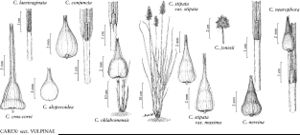familyCyperaceae
genusCarex
sectionCarex sect. Vulpinae
speciesCarex stipata
varietyCarex stipata var. maxima
Difference between revisions of "Carex stipata var. maxima"
Ill. Carex, 122, plate 391. 1862.
IllustratedEndemic
Synonyms: Carex stipata var. uberior C. Mohr Carex uberior
Treatment appears in FNA Volume 23.
imported>Volume Importer |
imported>Volume Importer |
||
| Line 61: | Line 61: | ||
|publication year=1862 | |publication year=1862 | ||
|special status=Illustrated;Endemic | |special status=Illustrated;Endemic | ||
| − | |source xml=https:// | + | |source xml=https://bitbucket.org/aafc-mbb/fna-data-curation/src/2e0870ddd59836b60bcf96646a41e87ea5a5943a/coarse_grained_fna_xml/V23/V23_467.xml |
|genus=Carex | |genus=Carex | ||
|section=Carex sect. Vulpinae | |section=Carex sect. Vulpinae | ||
Latest revision as of 20:41, 5 November 2020
Culms to 120 cm × 7 mm. Leaf blades glaucous, to 100 cm × 8–15 mm. Inflorescences to 15 × 4 cm. Perigynia to 5–6 × 2 mm; beak 3–3.5 mm.
Phenology: Fruiting Apr–Jun.
Habitat: Seasonally saturated or inundated soils in wet meadows, marshes, edges of tidal marshes, cypress swamps, or alluvial bottomlands
Elevation: 0–1500 m
Distribution

Ala., Fla., Ga., Md., N.C., Ohio, S.C., Va., W.Va.
Discussion
Carex stipata var. maxima replaces Carex stipata var. stipata in the southern parts of its range and is distinguished by its larger size, longer perigynia, and longer beaks.
Selected References
None.
Lower Taxa
None.
